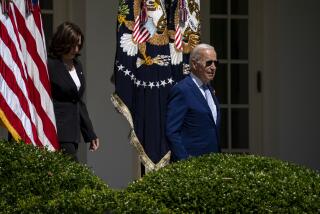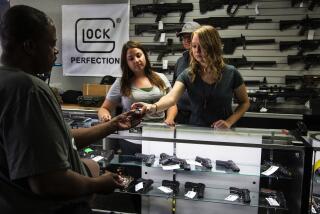Editorial: California’s proposed gun laws won’t change our culture of violence, but they will make us safer
California already has some of the toughest gun regulations in the country, but they unfortunately include a few loopholes big enough to shoot a bullet through. Four measures moving toward the floor of state Senate could help close some of them.
Building on laws in Los Angeles and San Francisco, SB 1446 would ban ammunition magazines holding more than 10 rounds. The state already outlaws the manufacture and sale of such high-capacity clips, but there’s no law against owning them. That makes no sense. There is no persuasive reason why any civilian should be able to fire so many bullets with such speed from a military style semi-automatic weapon. It was just such capability that helped the San Bernardino shooters cause so much carnage in such a short period of time last year.
Being able to replace ammunition clips quickly also adds to the death tolls in mass shootings. Current state law requires semi-automatic rifles be equipped with a fixed magazine that requires a tool for its removal. But gun-makers have found a work-around: a locking mechanism for the magazine that can be undone simply by pressing a recessed release button (using, for instance, the tip of a bullet to do so). That little bit of ingenuity satisfies the law but thwarts the intent of the locked-clip requirement. SB 880 would ban the future sale of firearms with the release button and require owners of existing models to register them with the state as assault rifles.
While state law requires a firearms dealer to file a record of sale with the state when a gun changes hands, no such requirement exists for ammunition — which, in fact, can be sold to just about anyone. (People barred from owning a gun are also barred from buying bullets, but that’s hard to enforce because no background check is conducted). An existing law that was to have resolved this issue for handgun ammunition is heading for the state Supreme Court after a lower judge ruled its definition of ammunition was too vague. Meanwhile, Senate Pro-Tem Kevin de Leon has proposed amending the law to clarify the definition, but an analysis by the Senate Public Safety Committee found the changes wouldn’t solve the problems found by the judge.
The gunman who shot and killed five people in Santa Monica three years ago was banned from owning a gun, so he bought the parts and made his own.
At the same time, Lt. Gov. Gavin Newsom is trying to put an initiative on the fall ballot to address the issue by requiring a point-of-purchase background check for ammunition sales, as well as banning the high-capacity magazines, among other gun-related policies. It’s unclear which approach — legislation or initiative — makes the most sense, but the goals are good and by the time the process is over, we hope the state is left with smarter, tighter laws.
One of the odder loopholes is definitional. The federal government regulates firearms, but not necessarily firearms parts early in the manufacturing process. That has led to a proliferation of businesses that sell components that, with a little time on a drill press, can be used to build semi-automatic rifles. Because those components aren’t by themselves considered a firearm, they don’t carry serial numbers. Serial numbers allow law enforcement to trace weapons.
SB 1407 would change that for a key gun part, called the lower receiver, which is where the firing pin, trigger and magazine come together in a semi-automatic rifle. Shops sell unfinished versions to folks who want to build a gun, which is legal as long as the builder doesn’t sell it. Under the proposed law, once someone buys an unfinished lower receiver to make a rifle, he would have to register it with the state Department of Justice and receive a serial number to be permanently affixed to the part.
How big a problem is this? The gunman who shot and killed five people in Santa Monica three years ago was banned from owning a gun, so he bought the parts and made his own. And in recent months, local and federal law-enforcement agents have arrested at least eight people in Northern California on charges relating to the sale of such guns, and have confiscated hundreds of the firearms.
These are good laws to have on the books because they make it harder for people barred from having guns and bullets to obtain them. While they alone may not forge a radical transformation of our gun-loving culture, they represent a few small steps forward in making Californians safer. That alone makes them worth embracing.
Follow the Opinion section on Twitter @latimesopinion and Facebook
More to Read
A cure for the common opinion
Get thought-provoking perspectives with our weekly newsletter.
You may occasionally receive promotional content from the Los Angeles Times.






